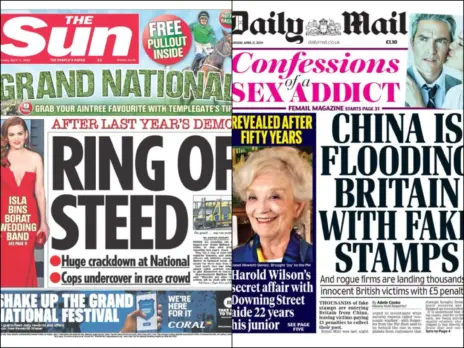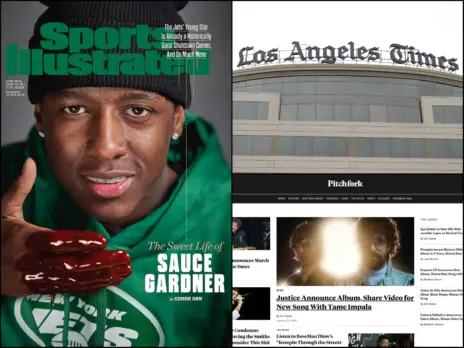A convicted robber who is alleged to have close links to dissident Republicans and to have been involved in a murder failed in a bid to get an injunction banning the Sunday World newspaper from writing about him.
Justice Gillen, sitting in the Northern Ireland High Court in Belfast, rejected Brendan Conway's application in a decision supporting investigative journalism and press freedom.
It was "in the public interest that investigative journalism should not be impeded where it is publishing legitimate information concerning serious criminal activity", he said.
Conway applied for an injunction on the grounds that the Sunday World – against which he has also launched a libel action – published a series of articles about him which amounted to a campaign of public vilification, harassment, libel, malicious falsehood and misuse of private information.
He also claimed the stories created a real and imminent risk to his life, said the police had given him two warnings that "criminal elements" were planning gun attacks, and said the stories amounted to a grave invasion of his private and family life.
The allegations in the stories including that Conway was a Real IRA chief who led a "tiger" kidnapping gang; that he was responsible for the murder of a drug dealer to avoid paying money he owed him, and that he had been a Special Branch agent and supplied other dissidents with cars fitted with bugging devices.
Justice Gillen, who said he was deciding the application purely as an interlocutory interim measure, said he accepted that there was a real and immediate risk to Conway's life.
But he went on: "A wholly separate issue however is whether there is a link between that real and immediate risk and the impugned publications in the defendant's newspaper. The defendant has satisfied me that no such link can be established in the following circumstances."
There was a great deal of material in the public domain about Conway's alleged criminality and dissident activities and associations, and his photograph was readily available.
The "sad truth" was that in the context of the situation in Northern Ireland, Conway had put himself at real and immediate risk by various activities.
"I do not import into this case anything other than general knowledge of local affairs in Northern Ireland when I say it is well known that such activities on the part of the plaintiff would invite threats to his life from a wide range of criminal elements in Northern Ireland," the judge said.
He went on: "True it may be that these articles have pursued the plaintiff's activities with all the accusatory fervour of unflinching and unsparing investigative journalism. But the intensity of the probe is often the lifeblood of the right of freedom of expression under the Convention.
"Measured engagement, studious calm or ruminative wisdom are not required desiderata of its exercise .
"These newspaper articles are but part of the widespread dispersal of information that abounded about this man in the public media."
There had been so much publicity about Conway's activities that it was "quite impossible to draw the conclusion that the threat to his life originated in these impugned articles".
But even if he was satisfied that there was some measure of a link between the real and immediate threat to Conway's life and the articles, they would have represented no more than a "small addendum", which would not have been sufficient to persuade him to grant an injunction.
Virtually all the information about Conway was already available to the public in one form or another because of his own activities – he had created his own risk, which was "not an exceptional risk".
Justice Gillen went on: "Moreover it is in the public interest that investigative journalism should not be impeded where it is publishing legitimate information concerning serious criminal activity.
"Section 12 of the Human Rights Act emphasises the care which the court must take not to interfere with journalistic freedom. To do otherwise would be to place a dead hand on the creative impulse of investigative journalism."
On the defamation element of the injunction claim, Justice Gillen said the Court of Appeal in Green v Associated Newspapers Ltd had "unequivocally reasserted the absolute nature" of the rule in Bonnard v Perryman against prior restraint injunctions in cases in which a defendant declared an intention to justify an allegation.
He also rejected the harassment element of the claim.
The Article 10 right to freedom of expression under the European Convention on Human Rights Convention right of freedom of expression did not extend to protecting remarks which were directly against the Convention's underlying values, he said.
But he was not persuaded that reporting investigations into criminal activity involving Conway, given the material already present in the media, was such as to justify interference with the newspaper's right to expose such matters.
The newspaper was "entitled to unflinchingly and robustly investigate such matters", the judge said, adding: "The interests of a democratic society in ensuring a free press to deal with such matters must weigh heavily in the balance in deciding whether curtailment of that freedom is reasonable and proportionate in this instance.
"Whilst the right of the press to freedom of expression can be subjected to restrictions which are prescribed by law and are necessary in a democratic society for the protection of the reputation of rights of others, nonetheless I must bear in mind that 'it is not for the court, or for the national courts for that matter, to substitute their own views for those of the press as to what technique of reporting should be adopted by journalists. Article 10 protects not only the substance of ideas and information but also the form in which they are conveyed'.
"Doubtless these articles are attended by elements of sensationalism but it is not for the courts to unduly restrict the discretion vested in editors as to how they present their stories.
"I am not satisfied that, given the circumstances which I have outlined above, this is one of those rare or exceptional cases which justify sanctions at the interim injunctive stage with a consequent restriction of the freedom of expression to this newspaper."
Email pged@pressgazette.co.uk to point out mistakes, provide story tips or send in a letter for publication on our "Letters Page" blog







